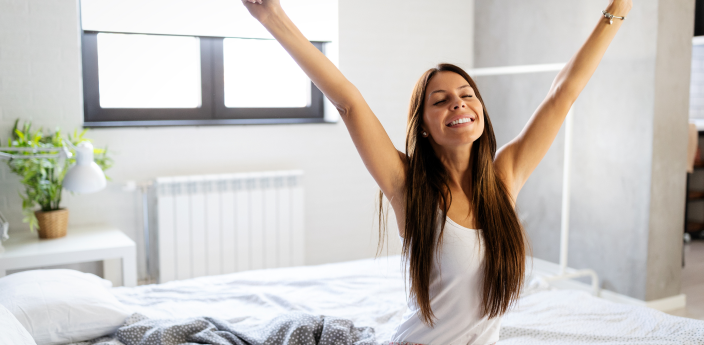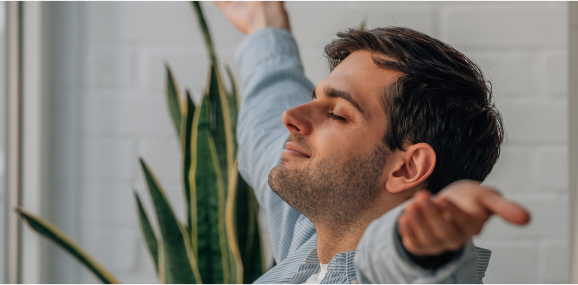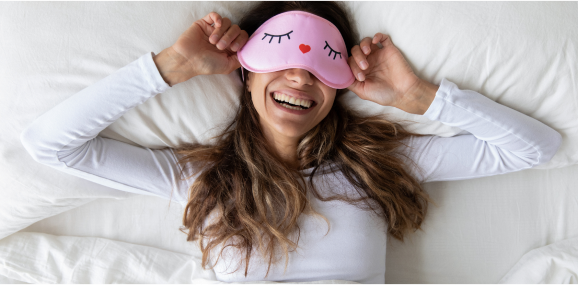If your alarm comes and goes and you’re none the wiser, something’s gotta give. We’re all occasionally guilty of oversleeping, but if it becomes a habit, it can become a major disruption to your daily life.
If you’re having issues with oversleeping, we’ll tell you what you need to know about waking up on time. We’ll also discuss how to tell whether there’s an underlying problem going on.
How Much Sleep Should Adults Get Each Night?
Adults should get a minimum of seven hours of sleep nightly, with the healthy range for sleep generally falling between seven and nine hours a night. Some people feel better when they sleep a little longer, but not by much.
If you work out often and your body needs time for things like muscle recovery, it’s better to get a little more sleep. On the other hand, if you had a lazy Sunday, you’ll probably feel fine on seven hours of sleep when Monday morning rolls around.
Listening to your body and using common sense can help you pinpoint the amount of sleep that works best for you. When in doubt, you can always ask your doctor if you’re sleeping enough.
Are You Sleeping Too Much or Sleeping Too Late?
In order to determine how to stop oversleeping, you need to define what you mean by oversleeping. That’s because there’s a difference between sleeping too much and sleeping too late.
For example: If you need to be up at 9 a.m., fall asleep at 5 a.m., and wake up at 10 a.m., you’ve slept too late. You slept less than you should have, but you still missed your alarm.
If you need to be up at 9 a.m., fall asleep at 9 p.m., and wake up at 10 a.m., on the other hand, you’ve slept too much. This is a completely different issue.
While there may be times when your body requests a little more sleep, like when you’re sick, it’s not regarded as normal to sleep excessively on a daily basis.
Why Are You Oversleeping?
How to stop oversleeping will depend on why you’re oversleeping. Some issues are easier to resolve than others.
Poor Planning
If you’re sleeping past your alarm because you go to bed late and aren’t giving yourself enough time to rest, this issue is easy to remedy: Set a bedtime and be firm with yourself.
Aim to set a bedtime that will give you at least seven solid hours of sleep. If you feel like you need a little more sleep, move your bedtime up earlier.
You’ll also want to consider any factors that contribute to your habit of delaying bedtime.
If you can’t get comfortable on a full stomach, try reducing the size of your dinner or having dinner earlier.
If you have too many nighttime chores like cooking, putting dinner away, and washing the dishes, try to delegate some of those chores to other people in your household or leave them for the next day.
If you stay up late scrolling on social media or playing video games, you’ll need to set hard limits with yourself. Allowing a designated period of time each day for fun hobbies — or setting a maximum number of episodes you can watch — will keep you from losing track of time and draining away your sleep hours.
Love of Sleep
When something feels good, you probably want to do it all the time. If you feel good when you eat chocolate, you probably have a hard time turning down brownies. And if you feel good when you’re snuggled in bed, you probably don’t want to get up.
If you’re otherwise healthy, oversleeping when you love sleep is a mind-over-matter scenario. If you’ve gotten enough sleep and it’s time to get up, you’re going to have to will yourself to do it.
Try to find something that can motivate you — this especially can come in the form of a morning routine that involves things you can look forward to when you get up, such as your favorite morning beverage and allotted yoga time to start the day. More on this later!
Mental Health Issues
Oversleeping can be an indicator of mental health problems like depression. If you believe you may be living with depression, you need to speak with a mental health professional. Effective treatment for depression can improve your life in many ways, not least of which is oversleeping less.
Physical Health Issues
If you’re temporarily dealing with a physical health concern like a cold or the flu, you probably shouldn’t try to stop oversleeping. Your body is overtaxed and working hard to fight off infection, and it’s able to do its best work while you’re sleeping.
In the case of sickness, oversleeping for a few days isn’t a bad idea. Your doctor will likely tell you to rest as much as possible while you’re recovering.
If chronic or recurrent issues with your physical health are leading you to oversleep, however, you need to see a doctor immediately. Persistent low energy levels and chronic pain aren’t conditions that will resolve with a little extra sleep. Instead, it’s important to treat the underlying issue.
What Are the Consequences of Oversleeping?
The consequences of not getting enough sleep are often discussed. But what happens if you get too much sleep?
If you’re regularly sleeping past the healthy maximum of nine hours, here’s what you need to be aware of.
Practical Consequences
The practical consequences of oversleeping are immediate. You’re late for work or school, you miss important plans, and your whole day runs askew when it doesn’t start at the appropriate time. Oversleeping can jeopardize your job or your education if you sleep through your required call time.
Consequences to Your Health
If you’re sleeping too much, you’re spending a lot of time in a sedentary state. Your body needs exercise for cardiovascular health, and if you’re living a sedentary lifestyle, you’re increasing your risk factors for conditions like obesity and diabetes.
Lack of movement may contribute to muscle soreness that can impact your overall mobility. This can have long-term consequences for your physical fitness and your ability to perform simple tasks.
How To Stop Oversleeping
Making your morning easier is an excellent idea. If your morning is low-stress and conducive to getting you out the door, it’s much easier to motivate yourself to get out of bed.
Leave the Curtains Open
The human body uses a process called the circadian rhythm to determine when it’s time to switch from wake mode to sleep mode and vice versa. If your room is very dark in the morning, your brain might have a difficult time flipping the “awake” switch.
To help hack the system, try sleeping with your curtains open. This allows sunlight to slowly fill your room in the morning. When you open your eyes and see the sunlight, your body and mind might respond by becoming more alert. It’s also difficult to fall back asleep in a bright room.
Give Yourself Something To Look Forward To
Make the morning as easy as possible by setting yourself up with coffee or tea and a healthy breakfast. You can set an automated coffee cup to begin brewing about 10 minutes before your desired wake time so that you wake up to the aroma of fresh coffee waiting for you.
You can also prepare a healthy breakfast ahead of time. Meal prep some overnight oats, breakfast burritos, frittatas, or mini quiches. You won’t have to cook or clean anything, just heat and eat.
Meal prepping can also cut some time out of your morning routine. If you would benefit from an extra 30 minutes of sleep, having breakfast ready can allow you to get that extra half hour without skipping your morning meal.
Limit Your Caffeine Fix
Having a cup of coffee or two in the morning isn’t a bad idea. As long as you aren’t sensitive to the effects of caffeine and you don’t notice a caffeine crash in the afternoon, go for it.
Just limit your caffeine consumption to early in the day. Having a caffeinated drink after lunch may have a prolonged stimulant effect that interferes with your ability to sleep.
Remember, you’re supposed to start feeling tired after dinnertime. Your body is telling you it wants to go to bed soon — not that it needs a double espresso for dessert.
Automate Your “Getting Ready” Process
Set everything up the night before. Pick out your clothes, grab a towel for the shower, and get your morning skincare products together. If you can complete your morning routine like you’re on autopilot, you’ll probably feel a lot better about the pacing of your morning.
Limit Nightly Disruptions
You may be more likely to oversleep if your sleep is interrupted. Disruptions to the phases of your sleep cycle — especially if they occur frequently throughout the night — can limit your body’s ability to reach deeper states of sleep.
If noises in your house or temperature fluctuations wake you up, take control of the situation. Make sure your thermostat is set to a comfortably cool temperature. Your pajamas and bedding should reflect your desired amount of warmth throughout the night.
If noises in your house or your neighborhood wake you up, consider using a box fan or a white noise machine to drown them out. With a little bit of soothing, boring noise in the foreground, other noises may blend in and go unnoticed.
Get a Good Night’s Sleep
Getting the proper amount of sleep is important, but so is the quality of that sleep. If you sleep horribly for 11 hours, you’ll wake in the morning feeling like you’ve barely rested.
For support with better quality sleep, the Hug Sleep Pod will keep you swaddled all night long. Simply put, it’s a little cocoon to keep you safe and snug. The pod is designed to provide gentle compression to your entire body to stimulate feel-good hormones like dopamine and help your nervous system relax.
The Hug Sleep Pod’s fabric is breathable, so you won’t get too hot inside it. The Move Pod even allows you to pop your feet out and move around easily if you need to get up.
If you need a little extra comfort and support to ease you through the night, let the Sleep Pod keep you tucked in all night long.
Sources:

































500,000+ happy customers